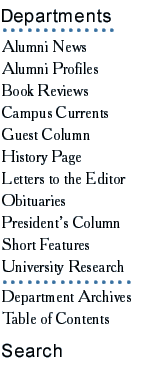

|

|
A Landscape of Words By Donald M. Murray '48 A few times, waiting to meet an old colleague, I've lurked outside a classroom in Ham Smith, hoping to observe what indeed goes on, even to catch a glimpse of the central activity of a university. Perhaps I will see on a student's face the look of surprise and delight when confusion comes clear. I may hear a question that hangs above a seminar table until it attaches itself to a student's mind for a lifetime. I may even find the mystery that is a university when a professor pauses during a lecture, surprised at a truth that has tumbled unplanned from her lips. But of course, I do not capture, see or hear what happens in a university. The central act is invisible -- a sudden, unexpected falling in love with learning that happens so quickly, so easily that neither the student nor the teacher knows that a life has been changed. I came to UNH first as a soldier in 1943 and returned from combat in Europe three years later, surprised to be alive. I carried little with me but the dream of becoming a writer -- a dream that seemed so wonderful, so removed from the ordinary person I was, that I imagined it to be impossible. Yet in Durham, I found professor Carroll Towle, who seemed to think my dream possible. Gwynne Daggett, Sylvester Bingham and others demonstrated lives lived in the landscape of language. Just as important, I joined a community of pilgrims who followed the same impossible vision. It happened in the mixture of hope and knowledge and obsession that is not only tolerated but encouraged in a university. I remember no moment of grand illumination, but in four semesters and two sessions of summer school, my dream became a vocation. I left UNH a writer and have, ever since, lived a life of words. It might have happened somewhere else, but I doubt it. It happened in the mixture of hope and knowledge and obsession that is not only tolerated but encouraged in a university. I returned to UNH 15 years later to teach. I worked hard at my new craft, but the more I learned to teach, the more mysterious this central mystery of the university became. It seemed the longer I taught, the less I taught, and the more my students learned. In fact, I did not teach so much as encourage. In my classroom, my office and my home, students found themselves part of a community that did not laugh at their dreams and allowed them to teach themselves the craft to which they, like their instructor, would forever be an apprentice. I never quite knew what worked on my page or in my classroom, but I am amazed, looking back, how many students left with a vocation for writing. I knew it was happening, but I could never quite see it, never be sure what had happened and when. The other afternoon, I was invited by John Lofty to meet with his class on the teaching of English. The students and I wrote together, then talked our way across the landscape of words that had become their teacher's life and mine. What happened? What did I teach? What did they learn? I do not know. What goes on in a university remains a mystery. I leave John Lofty's class and cross the boundary between gown and town. At home, I again observe antics of the university community with amusement, amazement and, often, a critical eye. But each morning, at 75 years of age, I return to the lifelong apprenticeship that began when I returned from war to the mystery we call a university. I still do not know exactly what happened to me at the University of New Hampshire, but I am grateful each morning that it gave me the courage to write what I do not yet know. ~ Donald M. Murray '48, a Pulitzer Prize-winning journalist and
professor emeritus of English, writes the "Over 60" column for The Boston Globe.
We'd like your opinion! Archives of guest columns . blog comments powered by Disqus9 Edgewood Road Durham NH 03824 (603) 862-2040 alumni@unh.edu |